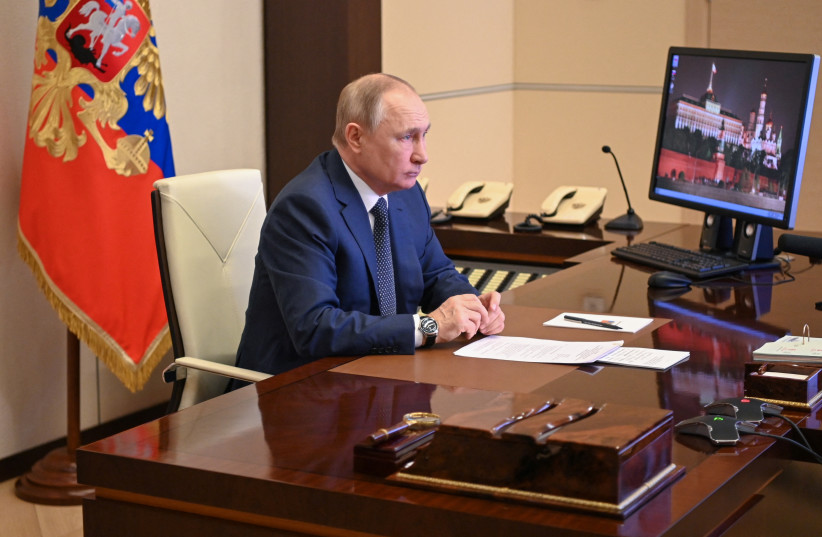The United States wants Israel and its allies to enact strong sanctions on Russia to help force an end to its war against Ukraine.
“We would like to see all of our allies and partners imposing strong sanctions,” a senior US embassy official told reporters in Tel Aviv, specifying that this includes Israel.
Pressed for US reaction should Israel fail to apply sanctions, the embassy official said: “I’m telling you what we would like to see. The strength of our sanctions package depends on broad participation. Our economic measures are strong because we are united with all our allies and partners who joined us.”
Such sanctions, he explained, have harmed “Putin’s ability to seek vital technology and critical trade.”
The official spoke just one day after US President Joe Biden imposed an immediate ban on Russian oil and other energy imports.

Israel has condemned Russia’s action and sent humanitarian aid to Ukraine, but has not formally leveled sanctions. Individual Israeli companies, however, have halted their operations in Russia.
Israel has attempted to walk a thin diplomatic line over the war, taking a strong stand in support of Ukraine and maintaining strong ties with the US. At the same time, however, it has been careful in its condemnations not to take actions that would cut off ties with Moscow, such as sanctions.
Prime Minister Naftali Bennett has used Israel’s strong ties with both Moscow and Ukraine to mediate between them. He met with Russian President Vladimir Putin in Moscow on Saturday and has engaged in telephone diplomacy with Putin and Ukrainian President Volodymyr Zelensky.
The US official spoke positively of diplomatic initiatives by Prime Minister Naftali Bennett and other international leaders to attempt to mediate an end to the war that began two weeks ago.
“We are supportive of all the efforts going on to try and bring this conflict to a close, including [from] EU leaders, individual EU country leader[s], PM Bennett,” he said.
The US official said that in all instances the Biden administration had been updated.
“In all these cases, these efforts have been closely coordinated with the US,” the official said. “There have been direct conversations before and after each of these encounters.”
He added that he sincerely hoped such diplomacy was successful but warned that the Russian engagement may not be sincere.
“We have seen Putin extend the false hand of diplomacy before,” he said.
The US official blamed Putin and Russian Foreign Minister Sergei Lavrov for the war, spoke vehemently of the need to end it, and accused Russia of inhuman acts that violate international law.
“Putin chose to start this war and the Russian Federation will be held accountable and bear the consequences of his actions,” the official said. The US, he said, has been “appalled by the brutal tactics and disregard for human life the Russian military has shown.”
HE CHARGED that Russia’s military actions were a “violation of International humanitarian law,” and that “criminal prosecution was appropriate.”
In the Middle East, he said, “Russian military and paramilitary forces have exploited conflicts for Moscow’s own selfish interests posing a grave threat to regional stability and global powers.”
Russia has a particular responsibility to uphold international law, given its role as one of five permanent members of the UN Security Council, the US official said.
He spoke of the bravery Ukraine has exhibited in defending itself against Russia, and the importance of supporting Ukraine, but said that public support in the US was against US military involvement in ending that war.
“We stand with Ukraine,” he said, but “it is also clear that at present, the US people are not looking for US forces on the ground on the front lines of this war.”
The official added that “the people of Ukraine are doing an outstanding job of defending themselves.”
When pressed later, he said that the US would honor its obligations as a member of the North Atlantic Treaty Organization (NATO), made up of 30 countries.
“The NATO charter is clear that an attack on one is an attack on all,” the official said. “Deterrence works.”
He said that the Biden administration would accept any agreement Ukraine might conclude with Russia that would end the war.
“The US is supportive of the solution that Ukraine is supportive of because we are backing Ukraine,” he said.
Among Putin’s demands have been Ukraine’s acceptance of Russia’s annexation of Crimea, and recognition of the Russia-occupied regions of Donbas (in eastern Ukraine) as independent states.
The US official was asked if the US would recognize those regions as part of Russia if that was part of a peace deal. He explained that he did not like to answer hypotheticals, but provided this observation.
“The US has a track record here with the Baltic states, which were for decades under Soviet rule and emerged as full states,” he said. “We tend to act on principle, at least historically.”
Meanwhile, Ukrainian President Volodymyr Zelensky asked Knesset Speaker Mickey Levy this week to address the Israeli parliament by videoconference, a spokesman for Levy said on Wednesday, confirming a Walla News report.
But Levy told him it was impossible because the Knesset is leaving on a two-month recess on Thursday.
Zelensky has addressed the European Union and British parliaments that way in recent days.
MK Eli Avidar, who is a former diplomat, asked Levy to convene a special session of the Knesset for Zelensky to address. But Levy said the best he could do was a meeting for the Ukrainian leader with MKs over Zoom.
“Unfortunately, the Knesset will also be going through renovations so physically it’ll be impossible to convene everyone back here,” a source close to Levy said.
Gil Hoffman and Reuters contributed to this report.
